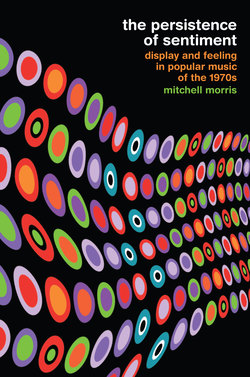The Persistence of Sentiment

Реклама. ООО «ЛитРес», ИНН: 7719571260.
Оглавление
Mitchell Morris. The Persistence of Sentiment
Отрывок из книги
The Persistence of Sentiment
Display and Feeling in Popular Music of the 1970s
.....
I was always somewhat resistant to some disciplinary strictures of my field, however. Although I spent a good deal of time in rehearsals and concerts, I never could muster the obsessive devotion to practice (of the canon) through which many performers incorporate the normative musical responses that most musicologists would expect. In music theory classes, I was uncooperative about internalizing “common-practice tonality” as the normative language of music because I liked the “ends” of music history—the Middle Ages and the twentieth century—better. When it came to critical or interpretive discussion, I always found it as interesting to discuss Joni Mitchell’s “The Last Time I Saw Richard” as it was to discuss Franz Schubert’s “Erlkönig.” I suspect that my tendency to forget to distinguish between the musicological canon and American popular music is somewhat generational. Born in 1961, I came after most hierarchies of prestige and value in music had begun to crumble. Although the collapse of such musical orders may have seemed terrifying to many scholars, I honestly did not know any better than to talk about what I liked.
I think that this is important, because in the discourse of popular music that has developed somewhere between the university world and demotic conversations, musicology qua musicology has been relatively absent. Even most musicologists and ethnomusicologists who have acted as pioneers have necessarily spoken to scholars in other disciplines rather than to their own closest associates. Part of the reason for the distance is our forbiddingly specialized lingo for discussing the particulars of musical sound; this language grew up over centuries of practical experience in music making as well as thinking about the results of our activities as musicians, and it is an astonishingly subtle resource. Another part of the reason comes from the ascetic commitment, in musicology at least, to a canon whose transhistorical value has rarely been questioned until fairly recently. For all our historical fastidiousness, musicologists have often wished to let “the music itself” occupy a rather ideal realm. And this music, by being liberated from the distresses of everyday existence, thereby acquired a power to comfort that should not be underestimated. Musicology’s passion for its canon and its canons has frequently acted as a “hedge around the Torah,” keeping the transcendental effects of music from too much contact with the contingencies of reality at the cost of keeping the laity at arm’s length.
.....